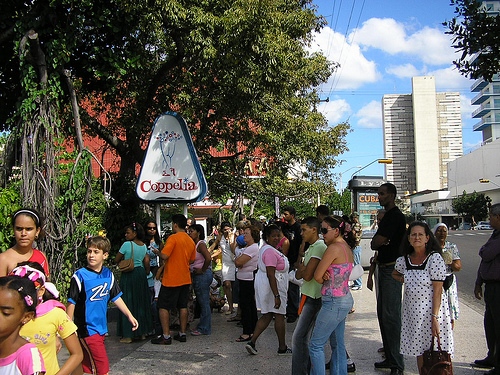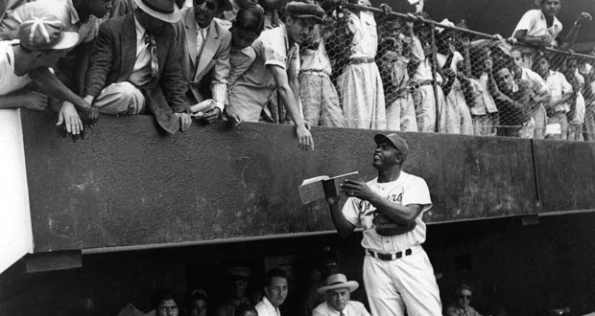 Fidel Castro has been an effective gravedigger. He buried sugar crops and the agricultural abundance of old. Recently, Cuba had to import sugar from Brazil and the Dominican Republic to meet the consumption needs of international tourists.
Fidel Castro has been an effective gravedigger. He buried sugar crops and the agricultural abundance of old. Recently, Cuba had to import sugar from Brazil and the Dominican Republic to meet the consumption needs of international tourists.
With this type of negative aura that has always surrounded Castro, it makes sense these days what baseball fans were saying after the dismal failure of Villa Clara in the Caribbean Series on Margarita Island: we are currently living through the last days of baseball.
I think not. We have the genes of baseball players in our DNA. Has it been dealt a fierce blow? It is true. Due to the obstinate and stupid policies of the state, baseball finds itself stationary, mired in crisis.
But we can make progress. If, for example, Cuban coaches could absorb the latest advances in the development of baseball via clinics (courses) with seasoned trainers from the United States. If the academies of the Major League organizations were allowed and if our players could play in the MLB without having to leave their homeland.
Although this would be the ideal, this nightmare of five and a half decades remains. In that sense, I am not optimistic. Because of the insane system established in Cuba, what could change within two years could equally extend for another fifty-five.
The methods used by autocrats to remain in power are known. Fear and repression inhibit many Cubans from publicly disagreeing. So people opt for a life raft. Marrying a foreigner. Or an offer letter of work anywhere in the world.
There are two possible scenarios. In the first, Raul Castro becomes a kind of tropical Jaruzelski and democratizes the island – I am skeptical – and the embargo is repealed. Perhaps, working hard, in around five or six years, Cuban ball players developed under modern methods would skyrocket into Major League teams.
The other option, the way we are going now, is that Cuba transforms into a discrete monarchy, where relatives, sons and compadres pull on the threads of the piñata and divide the loot amongst themselves.
The regime is engaged in unprecedented ideological spin. A mixture of family capitalism, few opportunities, micro-businesses and pure Stalinism.
The Castros want to negotiate, but with the gringos. Face to face. Seated at a table, dividing up the island as if it were their property. Under one of these scenarios, Antonio Castro, son of Fidel, would represent baseball and manage the future contracts of Cuban players.
The mouths of the Castro clan must be watering just thinking about that possibility. It has not yet arrived, but it looms, in backroom negotiations with businessmen of the style of Alfonso Fanjul.
If we want to raise the capacity of baseball, change must happen urgently. If the creole mandarins were sensible – 55 years have shown otherwise – they would design a new structure for the National Series. 16 teams seems to me too many.
Right now, according to the proven quality of local baseball, the right number would be a season with 6 teams and a minimum of 100 games.
The season should begin in September. You could have three stages. Six innings in the first 60 games. A round robin with 40 games and 4 teams. And ending with play offs between the top two in a best of seven matches.
The season would end in late January, so as not to overlap with the Caribbean Series or the World Baseball Classic. The few classy players that are left us, such as Alfredo Despaigne, Yulieski Gourriel, Frederick Cepeda, Norge Luis Ruiz, Freddy Asiel Álvarez or Vladimir García, if they are contracted to foreign leagues, it is preferable that they not to take part in the National Series.
The current level of our baseball only serves to stall us. Of course, before reforming the National Series, we should strengthen all of baseball’s development structures. From childhood to youth categories.
If the development categories of cadets and youth are still playing with limited quality balls, poor quality equipment, and bad playing fields, then the jump to premier level will not be achievable.
Cuba’s best trainers must work in the minor levels. All the people qualified to train players must have unlimited internet access to the latest information and game statistics.
Also, we should participate in academic and training camp baseball exchanges with the United States, Japan, South Korea and those Caribbean countries that play baseball. Cuban television should more frequently broadcast Major League games. Without the complex absurdities of broadcasting innings during the time that baseball-playing Cubans have to be on the move.
All that policy reorganisation would have to include selling affordable gloves and balls for children. Similarly, it would require the reconditioning and recuperation of those baseball fields that have been lost in the country.
The task is arduous and expensive. It remains to be seen if the state would find the resources or contemplate an agenda to improve the quality of the current game. If it’s smart, it would be the most practical idea. Then, in the unlikely event that Antonio Castro sits down to negotiate with MLB managers, we would have a greater amount of talent to offer.
Although I see the vision, insight has not been the greatest quality of the olive green autocracy.
Iván García
Photo: During the cold months in the United States, many players moved to the Caribbean to play baseball, including Jackie Robinson (1919-1972), who is pictured signing autographs at a stadium in Havana in 1947. A few weeks later, Robinson made history in his country by breaking the barrier that barred black players playing in the majors, thereby paving the way for other African-American, Caribbean and Latin American players. Taken by AARP Magazine.
Translated by: CIMF
18 March 2014

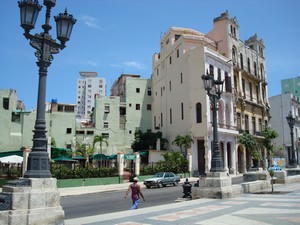

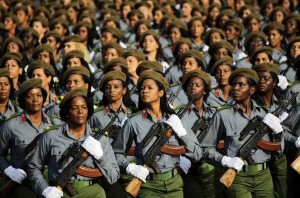 The artisan Orestes C. A. thinks that “most of those attending the parades don’t do so on their own initiative, nearly all are called to go by their school or workplace. Even the officials go because they have to. The case of the military and the “militia” is different; the officials govern and organize as if they owned the country; the military are like zombie guerrillas trained months in advance in exchange for promises and perks for their loyalty.”
The artisan Orestes C. A. thinks that “most of those attending the parades don’t do so on their own initiative, nearly all are called to go by their school or workplace. Even the officials go because they have to. The case of the military and the “militia” is different; the officials govern and organize as if they owned the country; the military are like zombie guerrillas trained months in advance in exchange for promises and perks for their loyalty.”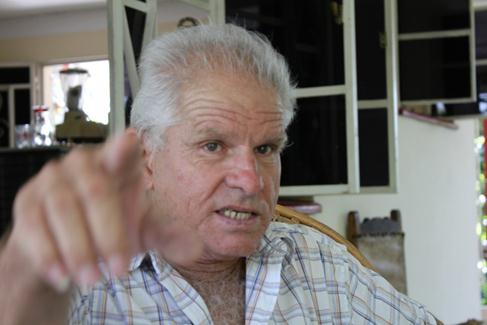 The Minister of Finances and Prices, Lina Olinda Pedraza Rodriguez, ordered the execution of a process of confiscation against Teófilo Roberto López Licor, 66, based on Legal Decree 149 “on the confiscation of goods and accumulations made through improper enrichment,” known as the Law Against the Newly Rich and its regulation, Decree No. 187, both from 1994.
The Minister of Finances and Prices, Lina Olinda Pedraza Rodriguez, ordered the execution of a process of confiscation against Teófilo Roberto López Licor, 66, based on Legal Decree 149 “on the confiscation of goods and accumulations made through improper enrichment,” known as the Law Against the Newly Rich and its regulation, Decree No. 187, both from 1994. Once or twice a week, I connect to the internet from a hotel in Havana. Connections from Cuba tend to be very slow, and the time gets used up trying to send in my work. When I have a few minutes, I go to the blog, but I can hardly ever read and respond to comments.
Once or twice a week, I connect to the internet from a hotel in Havana. Connections from Cuba tend to be very slow, and the time gets used up trying to send in my work. When I have a few minutes, I go to the blog, but I can hardly ever read and respond to comments. The Cuban revolution ceased to exist in 1976. The death certificate was signed when they put into force a rigid constitution and institutionalized the country with a questionable political-administrative division.
The Cuban revolution ceased to exist in 1976. The death certificate was signed when they put into force a rigid constitution and institutionalized the country with a questionable political-administrative division. When I first went to his home, what struck me most was an old glass cabinet. Inside, sorted by date, were national newspapers from at least ten years before.
When I first went to his home, what struck me most was an old glass cabinet. Inside, sorted by date, were national newspapers from at least ten years before.